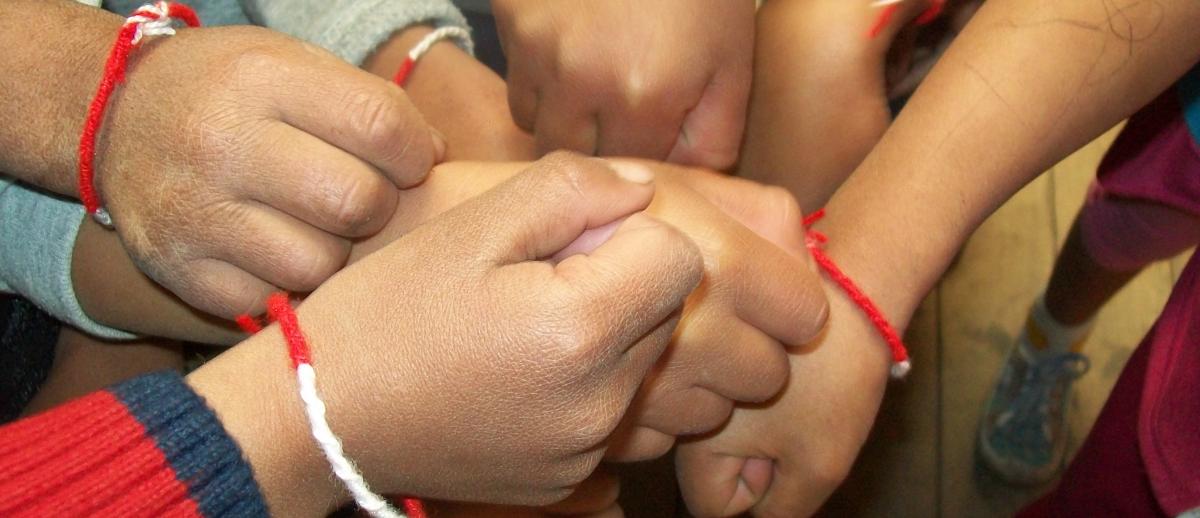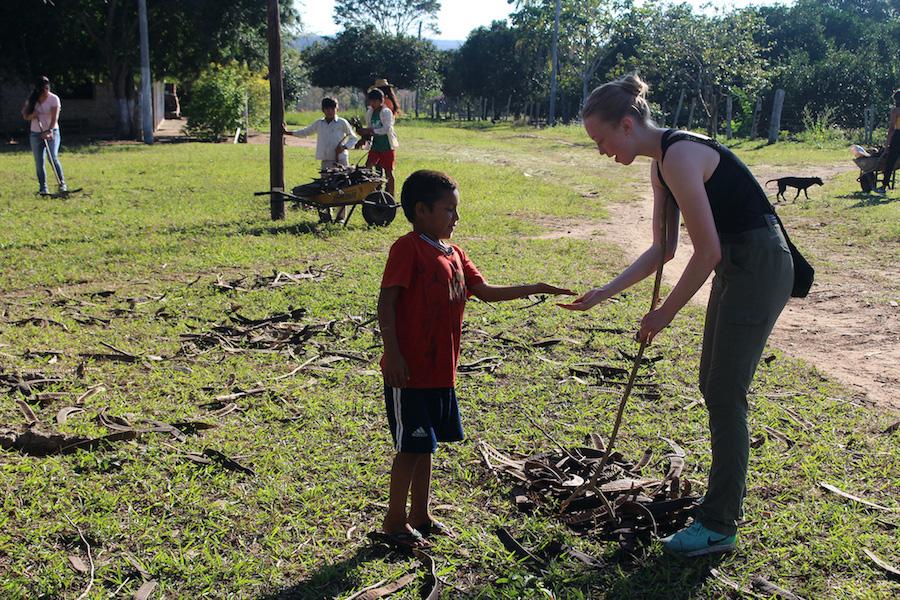Global Education and Ethical Global Relations
archive


hands together in Ecuador. Photo courtesy of the authors (Credit: Marian DeCouto)
Global Education and Ethical Global Relations
What does it mean to “diversify” global education in the context of post-secondary schooling and what kind of academic programming can support such a goal? We address this broad question from our local perspective in the Department of Global Studies at Wilfrid Laurier University (WLU), where, for the past decade, we have coordinated a program for global education. The Arts Global Experience (AGX), open to all undergraduates in the Faculty of Arts, offers students a chance to connect academic inquiry with experiential activity by participating in four to eight-week volunteer placements with various international organizations, social enterprises, or intercultural learning encounters around the globe. The fundamental assumption of the program is that living and working in different cultural contexts alongside community partners encourages students to learn about themselves in relation to others and to broaden their awareness of the challenges of global justice and social equity.
As we have learned through our work with students, the on-the-ground realities of such programs are often at odds with their lofty goals. This is an important disjuncture to address considering the recent spotlight on diversity and internationalization as common to the strategic objectives of institutions for higher education across North America. Such strategic objectives respond to various pressures from without the university and engender different commitments from within it. In the current environment of neoliberalism, which arguably characterizes public education in our province of Ontario, funding to universities is increasingly influenced by political agendas and tied to metrics such as employment statistics. What counts as “experience” and “diversity” in this environment often reflects a normative approach—for example, experience is understood as job training as opposed to formative intellectual development, whereas diversity is often reduced to a series of identity checkboxes. So how do programs for global learning balance normative understandings of diversity and internationalization against those with more radical potential—ones that account for the ways in which structures of inequality have produced institutions of higher education as part of the problem of inequity, as opposed to its solution? What can global education meaningfully contribute? In this short article we think about diversity as a relational phenomenon that foregrounds global ethics, and explore the specific challenges and possibilities this poses to our program at WLU.
How do encounters across difference enable students to take action against structures of global inequity and how do they build these actions from a place of mutuality? The AGX is designed to help students develop a concrete ethic of cross-cultural work in global environments and scaffolds this learning via four program elements. Eligible participants first undergo an application process with the AGX coordinator, who guides them in their choice of a potential placement. Important here is an assessment of the resilience of the individual to cope with the challenge they have chosen for themselves. Once the student has been accepted to the program, they enroll in a twelve-week pre-departure course that aims to develop critical thinking skills as well as practical strategies for a constructive and logistically safe learning experience. The placement, which is undertaken over the summer semester, is supervised at a distance by a faculty member who provides a structure for academic learning and reflection. Students typically are posted for a period of four to eight weeks in a variety of institutional and community settings, including, for example, local NGOs in Ghana, Ecuador, Zambia, and Palestine. Finally, a six-week post-placement academic course allows time for the student to re-connect with their learning cohort and to reflect on and integrate their experience with their broader academic goals and community. From the perspective of learning objectives, the AGX seeks to impress in the student an understanding of the following: 1) the important similarities and differences in cultural, social, and political life around the world, as well as the role of globalization in generating processes of encounter, exchange, hybridity, and homogenization with respect to these spheres of life; 2) globally prevalent normative principles—such as equality, justice and peace—and how they shape global institutions, policies, and social movements; 3) the power-infused relationships between self and others, as well as the social, economic, political, and religious influences that shape our own worldview and positionality within those relationships; and 4) how to engage with the world in potentially transformative kinds of social and political action, while displaying a mindfulness of the limits of one’s own knowledge and agency.
The Challenge
The challenge of a relational orientation to diversity requires that students build intellectual and emotional bridges made from an awareness of their own social location in the world. These traverses are not easy for our students. A deeper consciousness of the contextual differences is only available if they also begin to recognize and understand the operative issues in their placement community. The initial global mindset of many of our AGX students can best be described as insular. This frequently leads to many mistaken assumptions, such as the belief that the community they plan to visit “needs” them. Although the pre-departure academic component of the AGX is structured in a way that encourages students to think critically and ethically about their role, “savior” conditioning is difficult to untangle in one course. As a result, their normative orientation is quickly shaken up by the cognitive dissonance experienced when they set foot in their AGX placement. In our reflective conversations with students who have undertaken the program, one of the most frequent responses is that they were “not needed.” Some students initially feel offended by that realization and question their presence—why have they been placed there?—but are then forced to reexamine their a priori assumptions. Had they really expected to “have a meaningful impact,” no matter how circumscribed their position, in a community they had never encountered before? Of course, these AGX students had skills and gifts—but not necessarily more so than the individuals they encountered in their placements.
The Possibility
The key possibility for students in the AGX program is how to foster ethically just relationships—those in which the inequitable distribution of wealth and power and other global injustices are recognized and acted upon. The ethical imperative is clear: while the AGX is developed with our students in mind, it should never be only about them without an equal degree of consideration for the host communities and their experiences. Just and ethical relations need to be at the core of student learning and the program is therefore designed for the student to experientially explore the dimensions of global relational ethics.
How do encounters across difference enable students to take action against structures of global inequity and how do they build these actions from a place of mutuality?
Our commitment to ethical relationships that take into account differences caused by unjust global structures is complicated by the question of mutuality. Mutuality seeks a common—or mutual—range of experience or circumstance as the grounds for relation. When AGX students seek mutuality (which they sometimes describe as “sameness” based on recognizable transcultural features) in their community placements, they can be too quick to jump to the universal without also acknowledging difference. An orientation of mutuality can thusly be contrived to override ethical responsibility and create a false equivalence—where minor sameness is acknowledged and difference and diversity are ignored. Alternatively, some students resist mutuality and only see difference. For example, a student placed in a village that relies on a subsistence economy could not normally pretend that their life-circumstance is a mutually equivalent experience—even if the music that is being listened to is, at times, the same. But there may be some sense of mutuality that can assist the parties to transcend borders and unite over issues. For instance, students are able to make common cause on environmental degradation or the climate crisis with people in their placement community, and can thereby experience a degree of mutuality on the issue (especially when attempting to address global structures) despite differences of cultural and economic circumstance. Most frequently, however, for students engaged in a “common/mutual cause” with placement communities, the difference of circumstance between home and placement will cast them in the position of allies instead of as citizens in the same predicament.

American students participate in an environmental justice program in Bolivia.
Climate change is only one example where negative global circumstances have contributed to positive relational dynamics between AGX students and placement hosts. It is here that a sense of mutuality can help the student to transcend barriers such as those imposed by neoliberal socio-economic frameworks that pit communities against each other in a race towards scarcity. Students can and do recognize a common perspective with their hosts in assessing culpability for the calamitous condition of the globe’s current state. And they observe the impact of globally unjust structures that benefit some at the expense of others. In other words, they learn to understand that global relationships can only be ethically fostered when socio-economic relational structures are also just.
This is precisely what we hope for the AGX program: that it is not only about the thrill of a cultural exchange, but also about how that exchange is shaped by the global ethical deficits in which they are implicated. Recognition of this element will, hopefully, allow students a more realistic picture of their transcultural experience and invite them to assess their privilege with genuine awareness. Certainly, they may understand themselves in a different light and realize that they were indeed “not needed” to save anyone. However, they also desperately need to learn about the complexity of global relations—and to join with their world neighbors and global peers in challenging the unjust structures of the world in order to co-create new kinds of relationship. If our AGX program can help facilitate such experiential learning, we will have achieved our goal.




